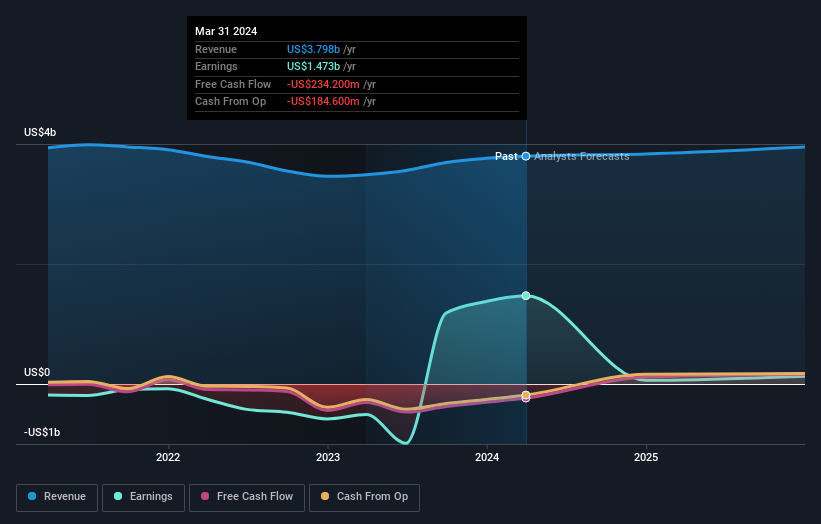Diebold Nixdorf, Incorporated Just Missed Earnings; Here's What Analysts Are Forecasting Now
Shareholders of Diebold Nixdorf, Incorporated (NYSE:DBD) will be pleased this week, given that the stock price is up 19% to US$38.00 following its latest first-quarter results. The results don't look great, especially considering that the analysts had been forecasting a profit and Diebold Nixdorf delivered a statutory loss of US$0.39 per share. Revenues of US$895m did beat expectations by 2.3% though. The analysts typically update their forecasts at each earnings report, and we can judge from their estimates whether their view of the company has changed or if there are any new concerns to be aware of. So we gathered the latest post-earnings forecasts to see what estimates suggest is in store for next year.
View our latest analysis for Diebold Nixdorf
Following last week's earnings report, Diebold Nixdorf's two analysts are forecasting 2024 revenues to be US$3.83b, approximately in line with the last 12 months. Statutory earnings per share are expected to plunge 96% to US$1.64 in the same period. Before this earnings report, the analysts had been forecasting revenues of US$3.83b and earnings per share (EPS) of US$3.61 in 2024. The analysts seem to have become more bearish following the latest results. While there were no changes to revenue forecasts, there was a pretty serious reduction to EPS estimates.
Althoughthe analysts have revised their earnings forecasts for next year, they've also lifted the consensus price target 72% to US$46.50, suggesting the revised estimates are not indicative of a weaker long-term future for the business.
Looking at the bigger picture now, one of the ways we can make sense of these forecasts is to see how they measure up against both past performance and industry growth estimates. It's also worth noting that the years of declining revenue look to have come to an end, with the forecast stauing flat to the end of 2024. Historically, Diebold Nixdorf's top line has shrunk approximately 5.0% annually over the past five years. Compare this against analyst estimates for the broader industry, which suggest that (in aggregate) industry revenues are expected to grow 5.9% annually. So it's pretty clear that, although revenues are improving, Diebold Nixdorf is still expected to grow slower than the industry.
The Bottom Line
The most important thing to take away is that the analysts downgraded their earnings per share estimates, showing that there has been a clear decline in sentiment following these results. Fortunately, the analysts also reconfirmed their revenue estimates, suggesting that it's tracking in line with expectations. Although our data does suggest that Diebold Nixdorf's revenue is expected to perform worse than the wider industry. We note an upgrade to the price target, suggesting that the analysts believes the intrinsic value of the business is likely to improve over time.
Following on from that line of thought, we think that the long-term prospects of the business are much more relevant than next year's earnings. At least one analyst has provided forecasts out to 2025, which can be seen for free on our platform here.
And what about risks? Every company has them, and we've spotted 3 warning signs for Diebold Nixdorf you should know about.
Have feedback on this article? Concerned about the content? Get in touch with us directly. Alternatively, email editorial-team (at) simplywallst.com.
This article by Simply Wall St is general in nature. We provide commentary based on historical data and analyst forecasts only using an unbiased methodology and our articles are not intended to be financial advice. It does not constitute a recommendation to buy or sell any stock, and does not take account of your objectives, or your financial situation. We aim to bring you long-term focused analysis driven by fundamental data. Note that our analysis may not factor in the latest price-sensitive company announcements or qualitative material. Simply Wall St has no position in any stocks mentioned.

